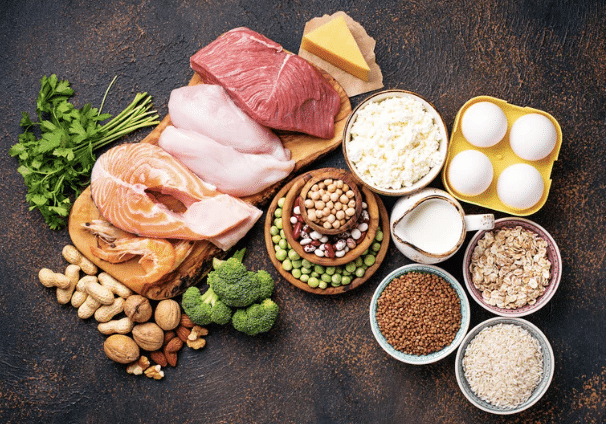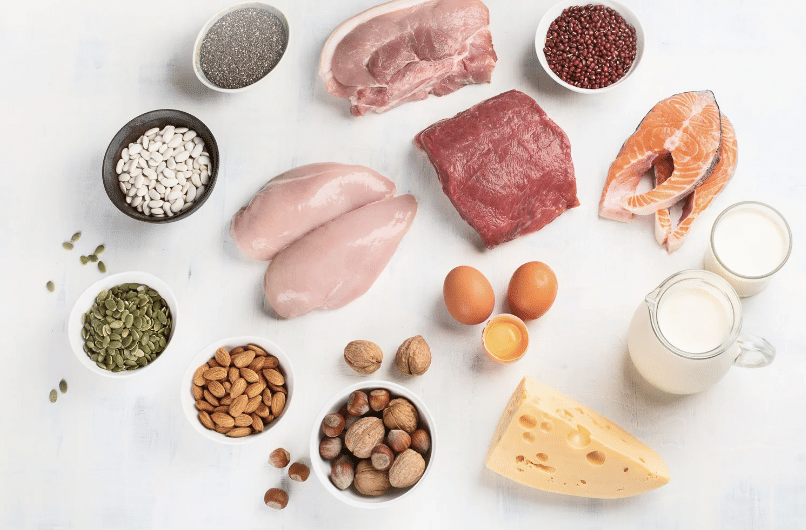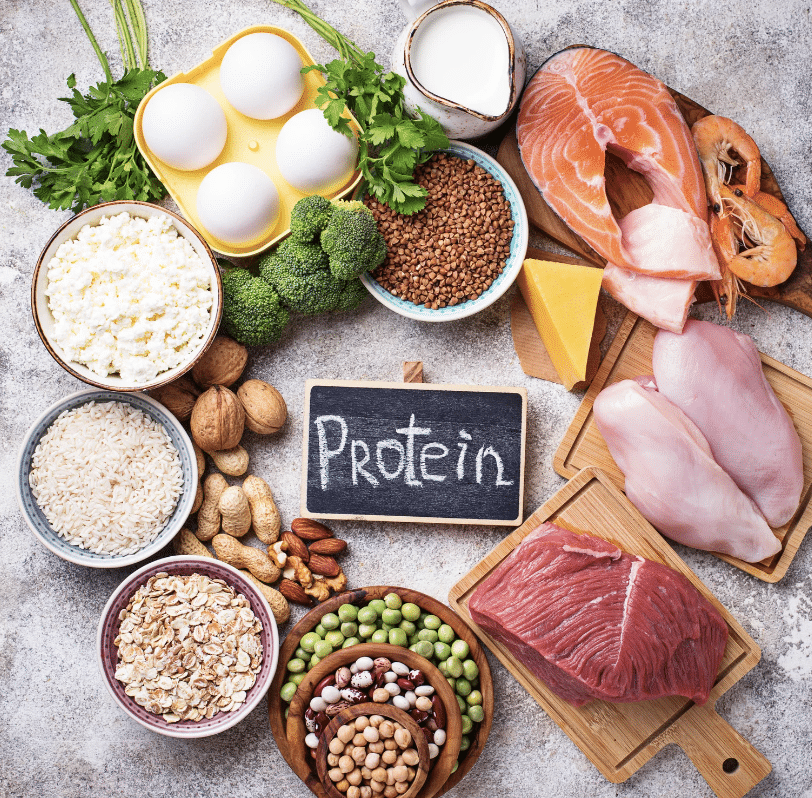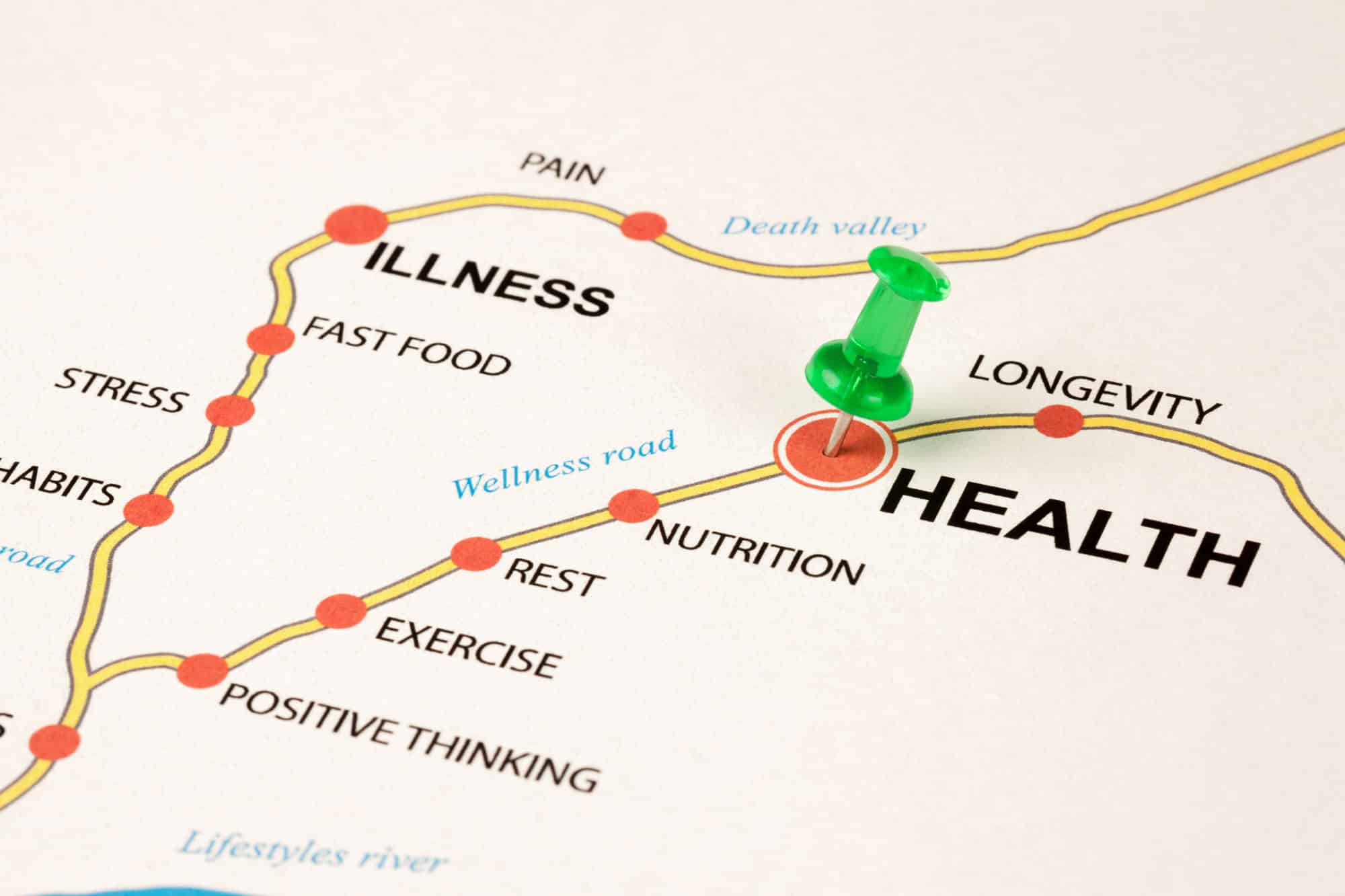Protein has become the star of the wellness world. From social media trends to grocery store shelves, the buzz around high-protein diets and products is everywhere. But how much of it is hype, and how much is backed by science? More importantly, what does this mean for health coaches supporting clients in their wellness journeys?
This guide breaks down the essentials of protein: how it works, how much we need, the benefits and risks, and how health coaches can help clients integrate it into a sustainable and personalized nutrition strategy.

What Is Protein and Why Does It Matter?
Protein is one of the three primary macronutrients (along with fats and carbohydrates) and plays a crucial role in building and maintaining tissues, creating enzymes and hormones, and supporting the immune system. Proteins are made up of amino acids. Some of these amino acids are essential, meaning we must get them from food.
A helpful coaching analogy: protein is like the bricks and repair crew for the body. Without enough, the structure weakens. With the right amount, we support growth, recovery, and long-term resilience.
Protein Quality and Sources
Protein quality depends on its amino acid profile and how well it’s digested and absorbed. Here’s a quick breakdown:
- Animal-based proteins (meat, poultry, fish, eggs, dairy): Generally complete proteins with high digestibility.
- Plant-based proteins (legumes, grains, nuts, seeds, soy): Often lower in one or more essential amino acids but can be combined to form complete profiles.
- Protein supplements (whey, casein, soy, pea protein): Useful in specific contexts, but whole foods are ideal when possible.

Health Coaching Tip: Encourage clients to focus on variety and whole-food protein sources. Use supplements strategically, not as a crutch.
How Much Protein Do We Need?
The Recommended Dietary Allowance (RDA) for protein is 0.8 grams per kilogram of body weight (g/kg). Yet it is important to remember that this recommendation is a minimum to prevent deficiency, not an optimal target for active or aging individuals.
Evidence-based guidelines:
General wellness/active individuals:
1.2–1.6 g/kg
Strength training or muscle-building goals:
Up to 2.0 g/kg
Older adults or those recovering from illness/injury:
1.2–1.5 g/kg or more
Health Coaching Tip: Start where your client is. If they’re currently at 0.7 g/kg and have shared with you that they want to increase their protein intake, help them aim for 1.0 g/kg first, then gradually build up.
Timing and Distribution
Rather than loading all protein into one meal, aim for even distribution across the day. Research suggests spacing protein intake (20–40 grams per meal depending on body size) can optimize muscle protein synthesis.
- Include protein in all meals (even a small amount is better than none)
- Post-workout protein may aid recovery, especially after resistance training
- A pre-sleep protein snack (like cottage cheese) may benefit older adults to encourage rebuilding and recovery overnight

Benefits of Protein
Protein plays a central role in:
- Muscle growth and recovery
- Satiety and weight management
- Preserving lean mass during aging
- Tissue repair and immune support
- Blood sugar regulation and metabolic health
Important: The benefits of protein are most evident when paired with physical activity, particularly resistance training.

Common Misconceptions and Cautions

- “More is always better”: Excess protein won’t necessarily lead to more muscle or better health.
- “You can only absorb 30g per meal”: The body continues to digest and utilize protein, but muscle-building effects may plateau beyond ~30–40g per meal.
- “Plant proteins aren’t good enough”: While they may be lower in certain amino acids, a varied plant-based diet can meet protein needs for most people, but working with a nutrition professional is recommended.
- Kidney health concerns: High protein diets have not shown harm in healthy individuals, but clients with kidney issues should consult their provider.
Health Coaching Strategies
- Start with the Baseline:
Use food logs or dietary recalls to assess how much protein your client currently consumes and what types of sources they prefer. This helps inform meaningful, personalized goals. - Engage in Collaborative Goal Setting:
Instead of telling clients to “eat more protein,” co-create SMART goals together—like adding one palm-sized protein source to lunch or trying a new recipe with tofu or lentils. The key is to trust the client’s wisdom and explore what changes feel sustainable to them. - Navigate Barriers with Empathy:
Budget, digestion, taste preferences, or ethical concerns can influence protein choices. By opening up a dialogue, you can tailor suggestions that align with your client’s values and needs, while referring to a registered dietitian or nutritionist when deeper guidance is needed. - Offer a Food-First, Flexible Approach:
Focus on high-protein foods like:- Eggs, Greek yogurt, cottage cheese
- Lean meats, poultry, fish
- Tofu, tempeh, edamame
- Lentils, chickpeas, black beans
- Nuts, seeds, quinoa
- Support with Tools and Education:
Teach clients how to spot protein on food labels, use hand-sized visuals for portioning, and build meals around protein as the anchor. Encourage curiosity about when protein helps them feel most energized or satisfied. - Collaborate and Refer When Needed:
Always recommend clients check with their doctor or a licensed nutrition professional to assess their specific protein needs. For those interested in learning more, suggest trusted resources like Forever Strong by Dr. Gabrielle Lyon.
Example Client Scenario
Client A is a 45-year-old woman with weight loss and energy goals. She eats ~60g of protein per day and often skips breakfast.

Coaching Strategy:
Ask this client if she would consider the following options:
- Tracking energy and satiety after 2 weeks to evaluate changes
- Adding a 2-egg veggie scramble or a Greek yogurt parfait to breakfast
- Shifting her afternoon snack to include 1 boiled egg + a handful of almonds
Takeaway for Coaches
The protein craze isn’t all hype, but it’s not a one-size-fits-all solution either. As a health coach, your role is to:
- Translate protein science into real-life food choices
- Help clients build sustainable, balanced meals
- Personalize approaches to match individual needs and preferences
The key takeaway is this: Protein is powerful, but coaching makes it practical.

Recommended Reading & Research
- JISSN Position Stand on Protein and Exercise (2017)
- “The Protein Craze” by Nature (2025)
- Nutrition Journal: Protein and Sarcopenia (2023)
- British Journal of Sports Medicine: Protein Meta-Analysis (2018)
This guide is for educational purposes and not intended to replace medical advice.
Our Latest Blogs
-

FMCA Community Impact Scholarship Recipients For March 2026 Announced
Read Full Article: FMCA Community Impact Scholarship Recipients For March 2026 Announced -

How FMCA-Trained Coaches Support Clients Independently
Read Full Article: How FMCA-Trained Coaches Support Clients Independently -

Cycle Syncing and Coaching: Understanding the Female Hormonal Rhythm
Read Full Article: Cycle Syncing and Coaching: Understanding the Female Hormonal Rhythm

